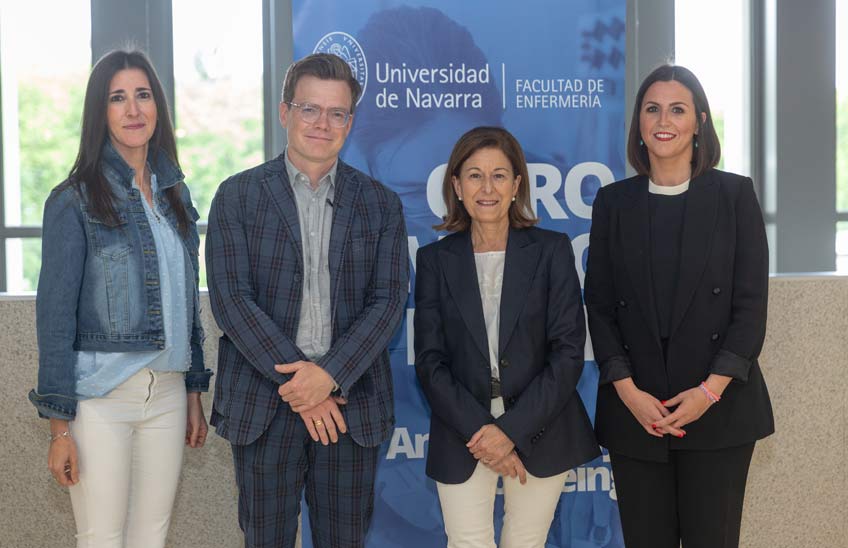Chair María Egea celebrates her tenth master class
The session was given by Axel Wolf, professor at the University of Gothenburg.

FotoManuel Castells<br>/De izquierda a derecha: Maddi Olano, Axel Wolf, Mercedes Pérez y Nuria Esandi.
31 | 05 | 2023
The Chair María Egea, of the School de Enfermería, held its tenth master class, an annual session in which internationally renowned speakers participate. On this occasion, it was attended by Professor Axel Wolf, from the University of Gothenburg, under the title degree scroll It's bow or never. The state of play in person-centred care and future visions.
The session started with the presentation of the Chair by the dean of the School, Mercedes Pérez Diez del Corral, who thanked the great support of the Egea family and the other institutions that collaborate with the research in nursing: "Much of the development of the School has been thanks to the Chair, since, with their support, today, we have competitive projects, with powerful lines of research ". In this sense, the School aims to offer a quality research "that has an impact on care and on teaching".
Subsequently, Nuria Esandi, vice-dean of research of the School and deputy director of the Chair María Egea, took the floor to detail the activities carried out by the entity throughout this course: "Thanks to the Chair María Egea, 4 grants have been awarded to support the Master's Degree in internship Advanced Nursing in Oncology, 2 grants for the mobility international of teachers of the School and 2 grants in projects for person-centered care and health promotion".
Professor Wolf then began his session, alluding that person-centered care is a topic "very important and necessary for today". Throughout his exhibition, and supported by scientific evidence, he presented programs of study demonstrating the different benefits that arise when person-centered care is applied: "We have seen a reduction in the cost of care by 40%, as well as in the days of admission between 30-50%, also in the issue of hospitalizations", and added that these benefits are also similar in primary care because "we have shown an improvement in the patients themselves, by reducing the Degree of uncertainty of their disease, as well as in an improvement in the environment of work and in the Degree of satisfaction".
This person-centered care can be "systematic and continuous," added the Swedish professor, because it is "the one that can have the greatest impact. On a day-to-day basis, nursing faces the same challenges: "We live longer and suffer from the same diseases. That's why we want to involve the patient in their care, as well as their family, and to do that, we need to optimize resources." Patients often rate "respect and dignity" as good or very good, but "if they don't understand the problem and don't know about their ailment, it makes it more necessary to support person-centered care."
Implementation in healthcare organizations
Wolf pointed out that "even if you think you are already working on person-centered care, your organization may not, so if you want to work on an ongoing basis, you have to work with that concept; define it, listen and present evidence". And he proposed the steps to follow in order to be able to work and implement it in your own place at work: "You have to identify the processes that we are good at seeing and which of them are already included in person-centered care. It is necessary to give continuity and a systematic approach , it is the core topic of success. Continuous learning through case studies and discussions is also necessary. And finally, we must start some strategy subject or group of work".
Lastly, he posed what the future of this field would be: "We need to combine precision medicine with person-centered care and integrate it. If we want to have high quality and low cost, if we want to have good care, we have to be able to use new strategies. Information technology, for example, has today broken down borders. So the future is going to be the collection of data thanks to this paradigm of digitalization".
